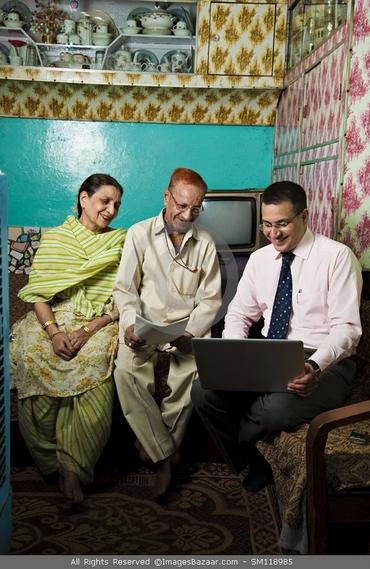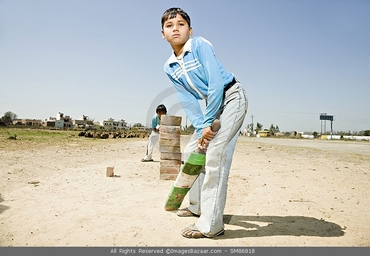Abhishek Mande
Meet Sandeep Maheshwari who runs ImagesBazaar that has over 800,000 Indian pictures making the largest stock of Indian images in the world.
When he was 13, Sandeep Maheshwari's father thought his son could do with a moped. So he bought the young fellow a shiny new two-wheeler thinking it would help him move around in Delhi, a city starved of a good transport system.
Little did Maheshwari Sr know that his son would actually make money out of the gift! On the first available occasion Sandeep rented out the moped to one of his friends who wanted to take his girl for a spin.
Within a matter of months, Sandeep was a star and became known to everyone looking for two wheels with an engine attached. The rate: Rs 50 per hour and the condition that the rider bears the fuel expenses!
It wasn't long before Sandeep not only recovered the cost of the moped but was also making money from it!
Later when his father fell on tough times, it was this entrepreneurial spirit that held him in good stead.
Sandeep dropped out of college and by the time he was 21 was earning over a lakh of rupees per month! Today, he runs Imagesbazaar.com, a stock photo company that has over 800,000 pictures making the largest stock of Indian images in the world.
Recently the 29-year-old entrepreneur received the 2010 Young Creative Entrepreneur Award from the British Council for 'his entrepreneurial skills through a perfect blend of a good idea and business venture leading to 'real' change'.
In an interview, Sandeep tells Abhishek Mande what this award means and the windows of opportunities it opens. He also speaks about the challenges he faced and how he overcame them.
...
'I started with a camera that cost me Rs 12,000'
Image: A photo from ImagesBazaarWhat doors does the 2010 Young Creative Entrepreneur Award from the British Council open for your business?
As part of the award, I will be visiting the UK and meeting some of the top ad agencies and design houses there. I fly there sometime next month. This will mean a great opportunity for us to network and negotiate with prospective clients. And since I will be going via the British High Commission, I'm assuming it will carry some weight.
There were about 753 creative entrepreneurs who applied online for this and ours was among the half dozen firms that were short listed in the communications category.
Was there any promise of investment in your company or was it just this trip?
The British Council, which gave out this award, will not invest in the company. But through the competition, it provided a lot of start-ups and small companies a platform to interact with some of the best-known venture capitalists and angel investors.
Among the judges were Mahesh Murthy, founder of Pinstorm and Managing Partner of Seedfund and Jai Vikram Bakshi who was representing the Indian Angel Network.
So it was a great opportunity for people who were looking for funding for their company.
Are you looking for funding?
No, ImagesBazaar isn't looking for funding right now. I started with a camera that cost me Rs 12,000. Today ImagesBazaar has a turnover of Rs 10.2 crore annually.
'People in the UK needed us as much as we needed them'
Image: A photo from ImagesBazaarYou mentioned that your company was among 753 others that were in the race for this award. Did the judges tell you what set you apart from the rest?
Most of the people who made their presentations there were focusing on how their services would be different from the rest and how UK would benefit from it.
What I focussed on was the fact that people in the UK needed us as much as we needed them. I pointed out that there are over 1.5 million Indians across the United Kingdom and there will be a need felt to connect with those people. That is where we come in.
There are already 25-30 stock photo and ad agencies that are dealing with us from there. So we have some amount of exposure to the market there. Also we can offer the option of outsourcing an entire shoot, which will possibly cost them a fraction of what it would if they had to send their crew from England!
We are also starting 3D photography, for which we have all the required equipment in place.
Why 3D?
The future will be 3D and we would like to get there before anyone else. Today for instance if a real estate developer wants to create a brochure for his project it will cost him about Rs 200 to Rs 300 per piece. For a mere Rs 10 extra, we can print him a 3D brochure that can give the reader a 3D view of the project. These technological advancements are becoming possible faster than you can imagine.
'In 2005 I hadn't even heard of the term 'stock photo''
Image: A photo from ImagesBazaarWhy did you start Shotindia.com? It seems like a competition to ImagesBazaar!
Today we have over 80 per cent market share in providing Indian visuals. But the world is moving towards microstock photography, which enables them to buy pictures for as little as $10 as against the average $100 per picture rate of Getty, Corbis and ImagesBazaar.
It will be a matter of time before there will be someone who will offer photos far cheaper than us. We thought it could well be part of our company! The model for Shotindia is pretty simple. We invite people from across the country to share with us their images and we give them 50 per cent of the selling price of the images. So you could be an amateur photographer or a professional, once your picture is taken, we will share with you half the sales amount.
Today we have over 8,600 registered users on Shotindia and a bank of 120,000 pictures there.
How did you come up with the idea for starting a stock photo agency?
In 2005 I hadn't even heard of the term stock photo. When I did and researched, I realised that it is a $1.5 billion industry worldwide!
In India despite there being agencies like Dinodia and India Picture (which is a representative for Corbis) I felt there weren't a lot of creative images with Indian faces. So I realised that there was a need for a service like this.
Before I started ImagesBazaar I ran a studio where we shot model portfolios.
Over the years I had done about 3,000 jobs. But I knew the truth of the modelling industry. From all the models that get their portfolios shot only 10 per cent of them get jobs. The other 90 per cent remain without any assignments.
I often felt guilty and wanted to do something about this. I realised I could shoot stock pictures using fresh models -- thereby creating jobs for them too. It seemed like a win-win situation.
'In the first six months we sold very few pictures'
Image: A photo from ImagesBazaarWhat were the initial challenges like?
To start ImagesBazaar, I shut the modelling portfolio arm of the company entirely.
In 2006, we took ImagesBazaar online with 8,000 images. But in the first six months we sold less than half a dozen pictures each month. We realised that in this business, 90 per cent of the images shot don't get sold.
Those were tough times and I had to invest my personal savings to keep the venture afloat. On the bright side we also realised that it was a good thing that we didn't stick to our initial plan of launching with 100,000 images!
Then there were technical issues where the site would take ages to load and a search query would take a long time to throw up results.
Finally I took to learning programming languages and helped create a backend database. Today we are one of the fastest stock photo website in the world.
The decision to shut down the modelling portfolio arm was conscious since we wanted to focus entirely on starting the stock photo business. It was difficult decision to make because for a good few months there wasn't any revenue coming in.
You mentioned you were in the model portfolio business. Are you a professional photographer?
A model friend once told me he spent Rs 10,000 on a photo shoot. I realised I could do it for less. I had done a two-week course in photography at some point and had shot a few portfolios once. But that was the extent of my learning and working knowledge of photography.
When I started the portfolio business I had just emerged out of a bad partnership and had lost a lot of money. So I borrowed Rs 12,000 from my mother and turned to photography.
I offered aspiring models a good deal on the portfolio and still managed to make a profit out of it. Initially my standing in the market wasn't very great. That's when I realised I had to do something about it.
So I approached the Limca Book of Records and attempted to create a world record. It took some legwork and some creative thinking.
I used to charge models as little as Rs 5,000 for shooting their portfolios. There were many who couldn't afford even that. I went back to our database and called up all those models and asked them if they could help me create the record and in return I would shoot their portfolio for Rs 500.
At the end of it I clicked more than 10,000 shots with 122 models in less than 10.45 hours!
Along the way I also managed to recover all the money I had invested in creating that record!
I got good media coverage for this feat and people began to recognise me. My standing in the market bettered and the business took off!
'I haven't completed my graduation because I felt it wasn't adding anything of any value'
Image: A photo from ImagesBazaarWhat were you doing before being in the portfolio business?
I had dabbled in a lot of things! In fact I haven't completed my graduation either because I felt it wasn't adding anything of any value.
Quite some time ago, I used to be a model once but I soon realised I wasn't cut out for it. I realised that there were a lot of models around me and so I thought that it made sense to shoot their pictures and make money rather than compete with them.
Since I was new I offered to shoot their pictures for as little as Rs 3,000. I managed to make a good profit out of it.
After that I joined a multi-level-marketing company called Japan Life. I rose up the ladder quite fast there and was making over a lakh of rupees each month before I resigned.
Then with three of my associates I started a multi-level marketing company called Customer Care India. Unfortunately it had to shutdown because of some differences between the partners.
And that's when I turned back to photography -- using the same business model of making portfolios at competitive rates.
Somewhere in between all of this I tried my hand at Amway and failed. I even made my own hand wash and tried to sell it with not a lot of success. And then I even wrote a book on marketing that opened from the right side rather than from the left. It was a resounding flop. I sold only 100 copies but the research I did for the book held me in good stead.
In retrospect I realised that these were all dots that would join eventually when I would launch ImagesBazaar.
'There is always a larger purpose in life'
Image: A photo from ImagesBazaarWhat would you say your past experiences taught you?
Oh that would be a lot to list! My modelling days made me realise what went through a model's head when she/he was facing the camera. It helped me when I stepped behind the camera and started taking pictures.
When I made the soap, I learnt what it is to sell a product. In Japan Life I learnt the importance of marketing and the difference between that and selling.
Eventually I was also required to make long presentations to large gatherings. It helped me connect with people and made me build my confidence and keep my motivational levels high.
With the failure of Customer Care India, I promised never to start a business with a partner because mostly it ends up being rather murky.
All along I stuck to my values -- never took a loan, started everything from the scratch and was always honest with the people I dealt with.
Would it be possible to share five tips for young entrepreneurs?
- Start small: Don't waste too much time thinking about something; just get down to doing it.
- Be a jack-of-all-trades: You will have to know everything about everything to be a successful businessman.
- Respect your team: They are the ones who will stand by you. In our company we have an almost zero attrition rate.
- Remain up to date: Don't wait for the rules to change. Be the game changer instead.
- Remember there is always a larger purpose in life and that there is much more to the world than your existence. Remember this at all times.








Comment
article